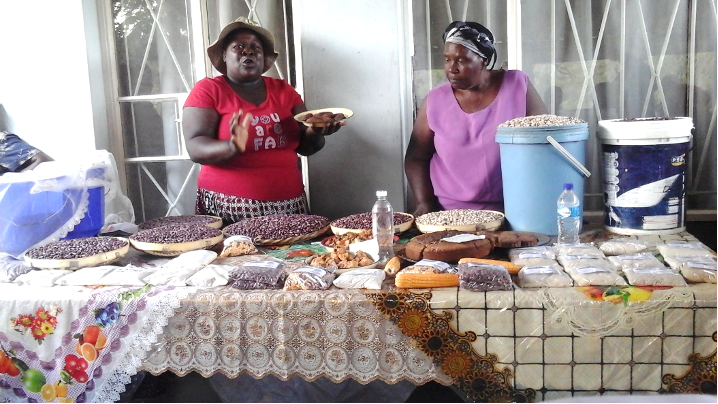
Hi. I’m Rachel Zozo, Monitoring and Evaluation Specialist at the International Institute of Tropical Agriculture (IITA), based in Nairobi, Kenya. Presented here are the results of an Outcome Case study of High Iron Beans (HIB) Compact in Zimbabwe to improve productivity for farmers in order to have higher returns. The study used both qualitative and quantitative methods to collect data and determine impact of productivity improvement for farmers involved in the HIB sector. The study used triangulation through interviews of 60 primary beneficiaries, 5 focus group discussions of 12-14 participants and field observations to corroborate the findings and reduce biases in the summary of findings, conclusions and recommendations. To address the productivity gap, the Compact introduced high yielding and nutrient-rich (Iron and Zinc) beans varieties that resulted in improved productivity on average by 1.08t/ha for NUA45, Sweet Violet 0.72t/ha and Cherry 0.79t/ha. These varieties offered high Returns on Investment (RoI) to farmers by generating on average a RoI of $8.35 for an average investment of $5.08per farmer despite the impact of cyclone Idai that crippled this part of the country in March 2019. The engagement of women and youth in entrepreneurship and men in the seed system is very impressive, regardless of the challenges they are facing to operate with no formal status in order to penetrate the market as cooperatives. It should also be noted that climate change adaptation coupled with good disaster preparedness is a major driver of HIB productivity improvement in fragile agro-ecological zones such as the north-eastern bean corridor in the Manicaland and Midlands Province of Zimbabwe considered, in ancient days, as the food basket of the country.

Hot Tip:
Increasing awareness creation on disaster preparedness and access to information on Climate Smart Agriculture (CSA) as requested by women during the study, will boost the uptake of HIB technologies and enhance community responsiveness to climate shocks (FAO, 2018; Lipper et al., 2018).
Lessons Learned:
- Women and youth are engaged actively in HIB grain production for value addition to improve household dietary needs and food diversification, while men are engaged in seed system with access to premium prices through performance contracts with seed companies. This improves livelihoods by positively enhancing the home structure and increased to meet household basic needs such as school fees, medical care, etc.
- Prior to the TAAT HIB intervention in these communities, bean production was not lucrative and was considered as women’s crop. However, the establishment of new roles for men and women in light of a newly developed seed system has been a game changer in the beans sector in Zimbabwe.
Rad Resource:
FAO. (2018). Tackling Climate Change Through Rural Women’s Empowerment. CA0178EN/1/07/18.
Lipper, L., McCarthy, N., Zilberman, D., Asfaw, S., and Branca, G. (2018). Climate Smart Agriculture Building Resilience to Climate Change. Vol 52. FAO. ISBN 978-92-5-109966-7.
Acknowledgement
This work would not have possible without the financial support of the African Development Bank for funding this work through the TAAT program. We cannot thank enough the key partners who have participated in this study and most especially the Alliance of Bioversity International and CIAT (ABC)-TAAT Coordination team, the ABC-Zimbabwe Office, the Department of Research and Specialist Services (DR&SS) staff, field site facilitators and enumerators in Manicaland and Midlands Provinces and their field partners. The completion of this work could not have been possible without the active participation, readiness and availability of all farmers, women and youth groups. We also thank the Pan- African Bean Research Alliance (PABRA) Network team for their invaluable contribution to this piece of work.
Do you have questions, concerns, kudos, or content to extend this aea365 contribution? Please add them in the comments section for this post on the aea365 webpage so that we may enrich our community of practice. Would you like to submit an aea365 Tip? Please send a note of interest to aea365@eval.org. aea365 is sponsored by the American Evaluation Association and provides a Tip-a-Day by and for evaluators.
